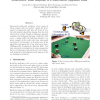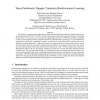24 search results - page 1 / 5 » Strategy Learning for a Team in Adversary Environments |
ROBOCUP
2001
Springer
13 years 9 months ago
2001
Springer
Team strategy acquisition is one of the most important issues of multiagent systems, especially in an adversary environment. RoboCup has been providing such an environment for AI a...
ICRA
2003
IEEE
13 years 10 months ago
2003
IEEE
Adversarial multi-robot problems, where teams of robots compete with one another, require the development of approaches that span all levels of control and integrate algorithms ra...
ALT
2010
Springer
13 years 6 months ago
2010
Springer
: In many prediction problems, including those that arise in computer security and computational finance, the process generating the data is best modeled as an adversary with whom ...
AGENTS
1999
Springer
13 years 9 months ago
1999
Springer
In this paper, we present a novel multi-agent learning paradigm called team-partitioned, opaque-transition reinforcement learning (TPOT-RL). TPOT-RL introduces the concept of usin...
ATAL
2010
Springer
13 years 6 months ago
2010
Springer
Recent studies have investigated how a team of mobile sensors can cope with real world constraints, such as uncertainty in the reward functions, dynamically appearing and disappea...


